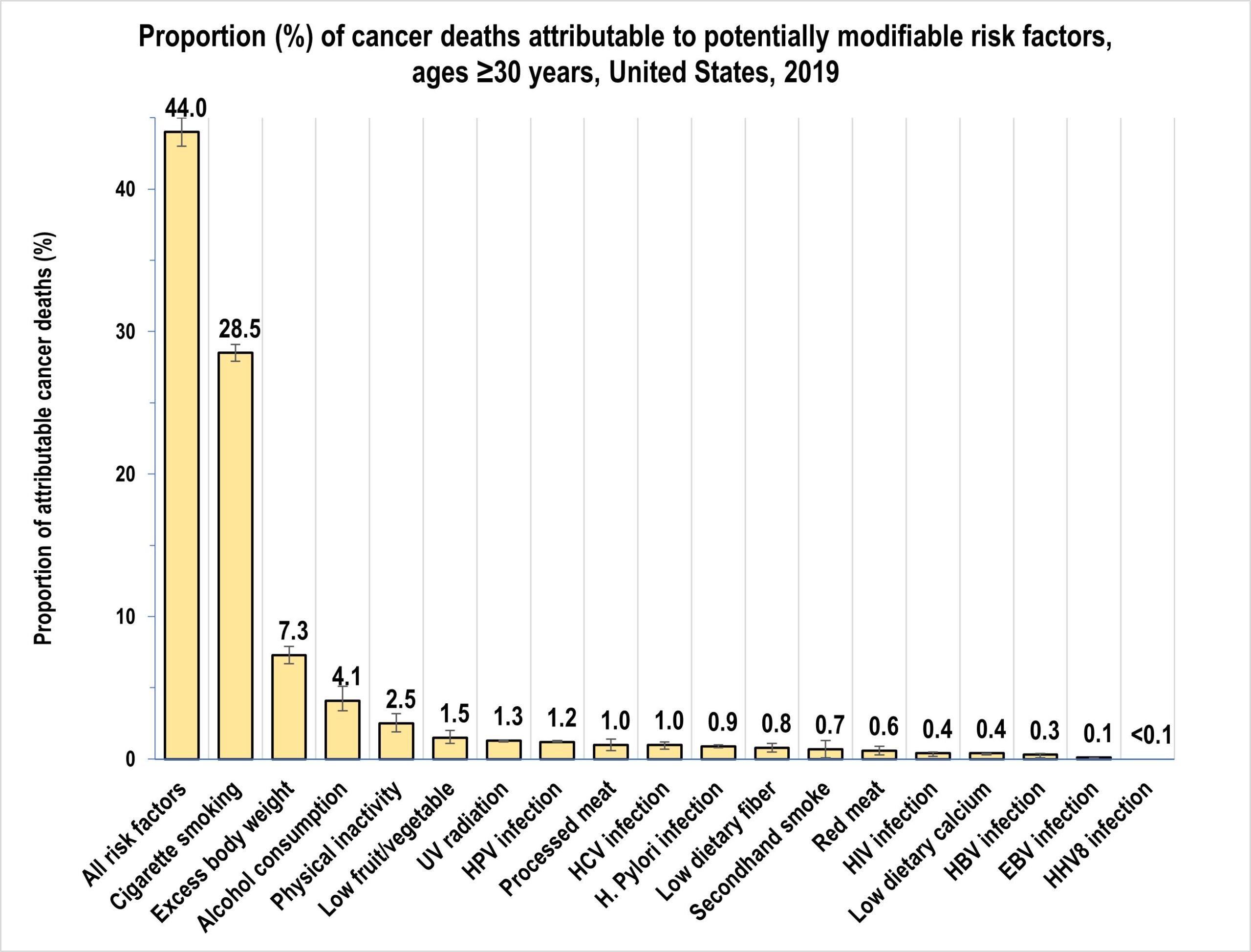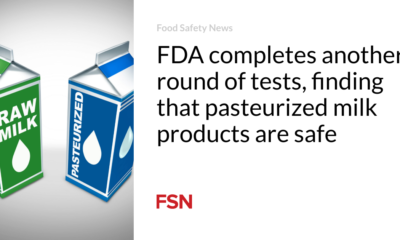Health
New research finds that 40% of cancer cases and nearly half of all deaths in the US are linked to modifiable risk factors

40% of cancer cases and nearly half of all deaths in the US are related to modifiable risk factors. Credit: American Cancer Society
A study led by researchers at the American Cancer Society (ACS) found that four in 10 cases of cancer and about half of all cancer deaths occur in adults aged 30 and older in the United States (or 713,340 cases of cancer). cancer and 262,120 cancer deaths in 2019) can be attributed to modifiable risk factors, including cigarette smoking, obesity, alcohol consumption, physical inactivity, diet and infections.
Cigarette smoking was by far the most important risk factor, contributing to almost 20% of all cancer cases and 30% of all cancer deaths. The findings are published in the journal CA: A cancer journal for physicians.
“Despite significant declines in smoking prevalence over the past decades, the number of lung cancer deaths due to cigarette smoking in the United States is alarming,” says Dr. Farhad Islami, senior scientific director of Cancer Disparity Research at the American Cancer Society and lead author of the report.
“This finding underscores the importance of implementing comprehensive tobacco control policies in every state to promote smoking cessation, as well as increased efforts to increase screening for early detection of lung cancer, when treatment could be more effective.
“Interventions to help maintain a healthy body weight and diet could also significantly reduce the number of cancer cases and deaths in the country, especially given the increasing incidence of several types of cancer linked to obesity, especially in younger individuals .”
In this study, researchers used nationally representative data on cancer incidence and mortality and the prevalence of risk factors to estimate the proportion and number of cancer cases and deaths attributable to potentially modifiable risk factors in general (excluding non-melanoma skin cancer) and for 30 types of cancer. .
These risk factors include cigarette smoking (current and former smoking); passive smoking; overweight; alcohol use; consumption of red and processed meat; low consumption of fruits and vegetables, dietary fiber and calcium in the diet; physical inactivity; ultraviolet (UV) radiation; and infection with Epstein-Barr virus (EBV), Helicobacter pylori, hepatitis B virus (HBV), hepatitis C virus (HCV), human herpesvirus-8 (HHV-8; also called Kaposi’s sarcoma herpesvirus), human immunodeficiency virus (HIV) and the human papillomavirus (HPV).
The results showed that cigarette smoking had the largest population-attributable fraction (PAF) or proportion of cancer cases attributable to risk factors in the population (344,070 cases; 19.3% of all cases), contributing to 56.0% of all potentially preventable cancer cases in men (206,550). of 368,600) and 39.9% in women (137,520 of 344,740).
Being overweight had the second largest PAF (7.6%), followed by alcohol consumption (5.4%), UV exposure (4.6%), and physical inactivity (3.1%).
By cancer type, the proportion of cases caused by potentially modifiable risk factors ranged from 100% for cervical cancer and Kaposi’s sarcoma to 4.9% for ovarian cancer and exceeded 50% for 19 of the 30 cancer types evaluated.
In addition to cervical cancer and Kaposi’s sarcoma, more than 80% of all melanomas arise from the skin (92.2%) and cancers of the anus (94.2%), larynx (89.9%), lungs and bronchi ( lung; 88.2%), pharynx anterior. (87.4%), trachea (85.6%), esophagus (85.4%), and oral cavity (83.7%) were attributable to evaluated risk factors.
Lung cancer had the largest number of cases attributable to evaluated risk factors in both men (104,410 cases) and women (97,250), followed by cutaneous melanoma (50,570), colorectal cancer (44,310), and urinary bladder cancer (32,000) in men and women. by breast (83,840), corpus uteri (35,790) and colorectal (34,130) cancer in women.
“These findings demonstrate that there is an ongoing need to increase equitable access to preventive health care and awareness of preventative measures. Effective vaccines are available against the hepatitis B virus, which causes liver cancer, and HPV, which can cause several types of cancer, including cervical, other cancers. anogenital and oropharyngeal cancers,” added Dr. Ahmedin Jemal, senior vice president, surveillance and health equity science at the American Cancer Society and senior author of the study.
“Vaccination at the recommended time can significantly reduce the risk of chronic infections, and therefore the cancers associated with these viruses. Uptake of HPV vaccinations in the United States is suboptimal.”
Other ACS authors participating in this study include Dr. Emily Marlow, Dr. Marjorie McCullough and Dr. Alpa Patel.
More information:
CA: A cancer journal for physicians (2024)
Quote: New study finds that 40% of cancer cases and nearly half of all deaths in the US are linked to modifiable risk factors (2024, July 11), retrieved July 12, 2024 from https://medicalxpress.com/ news/2024-07-cancer-cases-deaths-linked-factors.html
This document is copyrighted. Except for fair dealing purposes for the purpose of private study or research, no part may be reproduced without written permission. The content is provided for informational purposes only.













